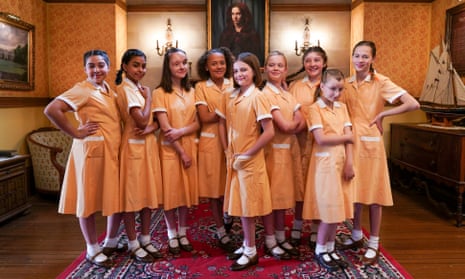There is a strong argument that Enid Blyton would not have become quite the powerhouse she did had it not been for the second world war. She wrote her first full-length children’s book in 1937 (she would produce more than 800 further such volumes during the next half century) and became fully established during the years of the conflict. It seems likely that the upheaval of the time created the perfect emotional appetite among a bewildered and powerless juvenile populace for formulaic, just-thrilling-enough adventures for brave children, or cosy boarding school stories that always ended with the good triumphant and the bad suitably punished – or shown the error of their ways and thoroughly reformed.
How right, then, that she and her particular brand of succour should return to us now, at a time of renewed national crisis. The BBC released its new 13-part adaptation of Malory Towers early on iPlayer when the schools closed, to provide extra entertainment for children suddenly shorn of occupation – and respite for parents suddenly overwhelmed. Now the series is being broadcast on CBBC, as originally planned.
The great skill in adapting much-loved material from big literary brands is to work out what is and is not broke. Blyton was a self-made, self-maintained brand – she knew what she could do and that it was successful, and did it, at a peak rate of 10,000 words a day, for 50 years without feeling the need to deviate from or stretch beyond her natural reach.
It is a lesson the writers of the series, Sasha Hails and Rachel Flowerday, have applied in abundance. They have kept Blyton’s utter lack of cynicism and her unstinting willingness to put the child reader (here, viewer) first and address them directly, simply and without condescension. They have kept the sense of joy and freedom Blyton’s characters always exude, and they tread as unerringly as she did the fine lines between jeopardy and real threat, moral dilemma and true conflict. The programme-makers are aided by a fine cast, especially Ella Bright as the central character, Darrell Rivers, who manages to pull off being cheery and (overall) good without being dull. Above all, Hails and Flowerday keep all the liveliness and charm the books have for readers who come to them at the right age and remember them fondly for decades thereafter. (A warning to the latter: do not attempt to reread and recapture the moment. Generally, it does not go well.)
The famous Blytonian weaknesses have been unobtrusively addressed. The cast is diverse in numerous ways – aside perhaps from class, which was probably always going to be a bridge too far for a 50s boarding school series – and Miss Grayling implicitly envisages careers for the “goodhearted, loyal women unafraid to forge new futures” in a world explicitly acknowledged (as was never done by Blyton) as still suffering the aftermath of war. Gwendolyn is as chided for her belief that all women need do is get married as she is for … well, being Gwendolyn.
At the same time, the behaviour and treatment of Gwendolyn is deepened. Instead of simply being the loathsome drip and sneak, a love-to-hate figure for the dorm and for generations of readers, we see her struggle with loneliness and an inability to make friends: she strikes out in response to her problems rather than through simple malice. That does not mean we need to forgive her for her public revelation of Darrell’s secret shame, mind you. Lines must still be drawn.
All the right tropes – midnight feasts, lacrosse team selections and disappointments, the formidable Matron (a Trunchbullesque figure played by This Country’s Ashley McGuire), the rock pool (although it now has a lifeguard, one of the few details that does strike an unnecessary unBlytonian note of modern realism) – are hit. It bowls along so smoothly and sweetly that you would be hard pressed not to love it.
Although. Although. There is a … boy. He is from the village, his name is Ron and I am not sure how I feel about that yet. Still, overall – absolutely ripping.
